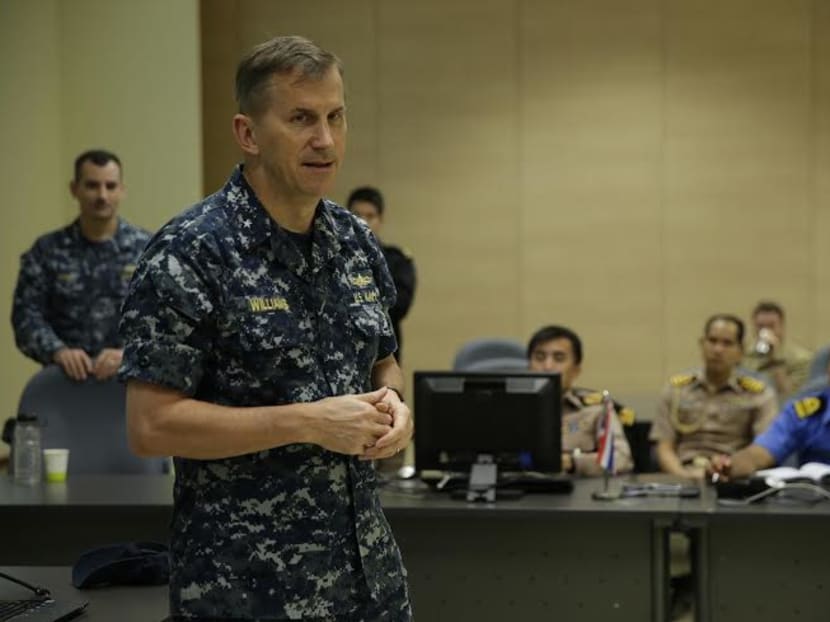US’ rebalancing ‘brings better training possibilities’
SINGAPORE — With the United States’ strategic rebalancing of the Indo-Pacific region, there are more possibilities for multilateral military exercises in the area to deal with maritime security challenges such as piracy and human trafficking by sea, said a senior American naval officer today (Oct 5).
SINGAPORE — With the United States’ strategic rebalancing of the Indo-Pacific region, there are more possibilities for multilateral military exercises in the area to deal with maritime security challenges such as piracy and human trafficking by sea, said a senior American naval officer today (Oct 5).
“There is a great opportunity in this region to take advantage of the already-existing individual exercises between many of the countries, and come together to multilaterally affect better interoperability and better training at sea,” said Rear Admiral Charles Williams, Commander of US Seventh Fleet Task Force 73.
Rear Admiral Williams was speaking to reporters on the sidelines of the 14th annual South-east Asia Cooperation and Training (SEACAT) exercise, which brings together participants from Singapore, Brunei, Indonesia, Malaysia, Thailand, the Philippines and the US.
The countries collaborate and execute practical maritime responses to multiple realistic scenarios such as smuggling, piracy and other illicit activities at sea. Naval representatives from Bangladesh, who were in command of ships that rescued migrants at sea, were observing SEACAT for the first time this year.
“So the opportunity to build relationships here, and perhaps see each other out at sea in effecting and conducting those missions, is tremendous,” said Rear Admiral Williams.
As part of the US rebalancing of the Indo-Pacific region, a new class of high-speed transport vessel — the Expeditionary Fast Transport (T-EPF) — was deployed to the Western Pacific for the first time.
The vessel, USNS Millinocket, is participating in this year’s SEACAT exercise for the first time as well.
This strategic shift also gave the US Navy the opportunity to contribute to the region, especially in areas of humanitarian assistance, disaster relief, and search-and-rescue operations, shared Rear Admiral Williams.
He pointed out that through the rebalance, the US Navy had two ships in Singapore last December — the destroyer, USS Paul Hamilton, and the then newly-arrived littoral combat ship, USS Fort Worth.
“We turned both of those ships around, and sent them to the Java Sea ... Through sheer presence, we were able to respond quickly and effectively to the AirAsia flight,” he said, referring to the involvement of the USS Fort Worth in the search for AirAsia flight QZ8501 that crashed in the Java Sea on Dec 28.
The flight went down less than halfway into a two-hour flight from Surabaya, Indonesia, to Singapore. All 162 people on board were killed.
Noting the increasing threat posed by maritime human trafficking activities, Rear Admiral Williams said the problem could be addressed with the presence of security forces to interdict suspicious vessels, being able to respond to a range of scenarios and, more importantly, the skills and relationships between sailors of different navies.
“The sailors that are on our ships, and are on our partner nations’ ships – those sailors grow in expertise and they foster relationships through exercises like this, and they may well have an opportunity in the future to employ those tactics and techniques and procedures, and to do so at sea to counter things like smuggling,” he said.







